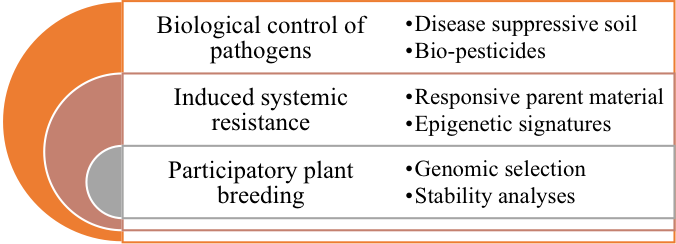About the Tomato Organic Management and Improvement Project (TOMI)
TOMI 3
The Tomato Organic Management and Improvement Project (TOMI) 3 was funded in September, 2024 by the NIFA OREI program. Demand for organic tomatoes continues to grow, yet farmers struggle to keep up due to foliar diseases that can move quickly through farm fields and decimate entire crops. The tomato organic management and improvement project (TOMI) has spent the past 10 years working with organic farmers to overcome this challenge through breeding and investigating how to promote beneficial plant-soil-microbial relationships. Now we propose to build on the knowledge and resources we have developed and create practical tools organic farmers can use to prevent foliar disease outbreaks and deliver tomatoes with end-use quality traits demanded by consumers in local marketplaces.
Our project will address these challenges by:
- identifying and overcoming critical factors influencing the survival and efficacy of biocontrol agents,
- establishing decentralized tomato breeding efforts based on regional needs,
- creating new decision-support tools (DSTs) to help farmers better manage foliar diseases though biocontrol and varietal selection, and
- establishing new support networks and delivering novel and inclusive training programs that will help Extension educators and organic farmers better manage foliar diseases in vegetable cropping systems and connect with local chefs to increase marketability of their produce.
TOMI 1 and 2
The Tomato Organic Management and Improvement Project (TOMI) Parts 1 and 2 were funded in 2014 and 2019 respectively by NIFA OREI. TOMI began as a response to the rapidly growing demand for organic, fresh-market tomatoes. Customers shopping in these markets expect fruit to have superior flavor in comparison to fruit purchased in supermarkets. However, organic growers struggle to meet this demand because many existing varieties with superior flavor are susceptible to foliar pathogens that cause diseases such as late blight, early blight and Septoria leaf spot.

TOMI 1 and 2 helped organic farmers improve the yield and quality of their crops by developing new approaches to manage foliar diseases. In particular, we identified biocontrol strategies that were most effective across multiple years and regions, and soil amendments that could support a soil-applied microbe and suppressive activity against foliar diseases. Results of these studies have led to new insights needed to help overcome variability often observed in farm fields when using biocontrol strategies. We also determined that tomato supports microbes that induce systemic resistance in a genotype specific manner, identified mechanisms supporting these 4 differences, and created mapping populations and initiated sequencing studies to identify markers to select for this trait. Germplasm with this trait has been included in our breeding program along with other disease resistance and desirable end-use quality traits. Advanced lines are being evaluated by commercial seed companies for potential release.
In the meantime, we have helped farmers identify existing varieties best suited to their farms and produce high-quality seed. Results of these studies have been shared broadly in more than 155 presentations. We have also hosted 12 webinars highlighting our work and other related resources, which are archived on this website. Results have also been published in 34 academic outlets including journal articles, theses/dissertations, and proceedings/abstracts, and 5 technical manuals, with more underway. Finally, 2 post-docs, 9 graduate and 40 undergraduate students received critical training in how to conduct transdisciplinary studies to meet organic farmer needs.
During TOMI3, we will continue bringing in resistance to other problematic pathogens like PM and Bacterial Spot (BS). We will also shift our focus to regional programs rather than focusing on broad adaption to better select for localized production challenges, and integrate selection for high tunnels as well as open fields, which have distinct environmental conditions and needs. All publications, webinars, outreach and education activities, and our decision-support tools will be linked from this website!
Funding

This project was funded in 2014, 2019 and 2024 by the Organic Research and Extension Initiative grant, part of the USDA National Institute of Food and Agriculture. Award numbers 2014-51300-22267, 2019-51300-30245 and 2024-51300-4337
